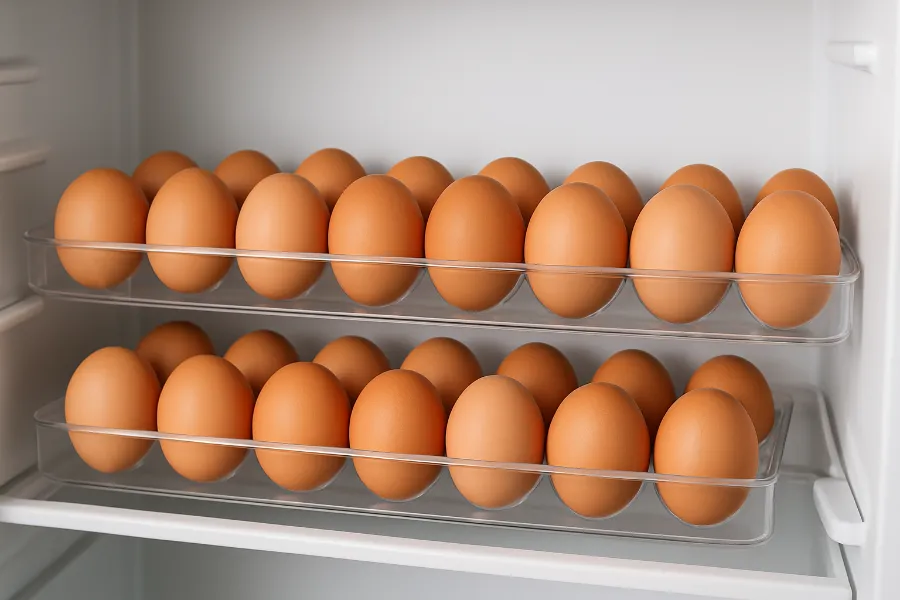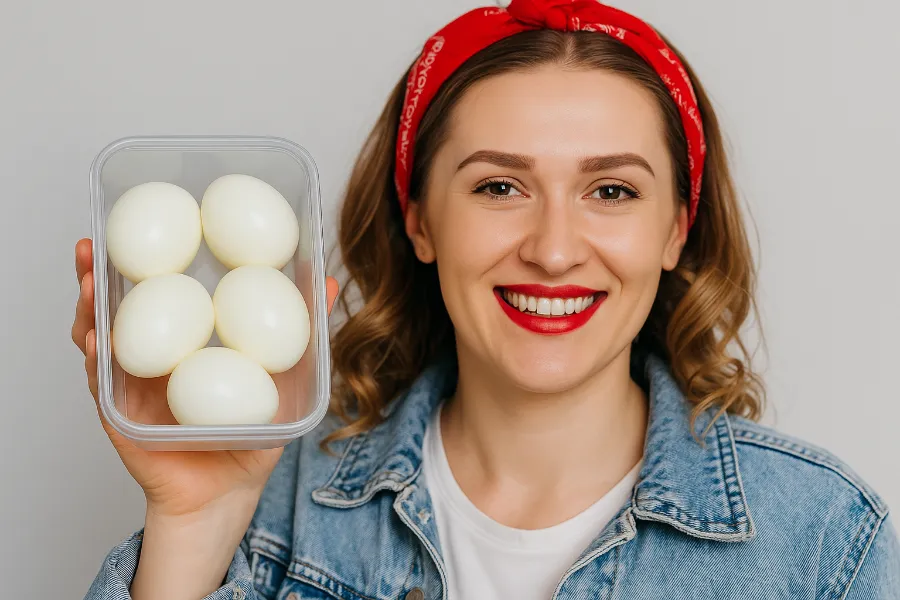I still remember the morning I cracked open my first farm fresh eggs—the yolks were bold orange, the whites thick and glossy, and the flavor was unlike anything I’d ever had from a grocery store carton. But once I started collecting more than my family could eat in a week, the questions began: How long do they last? Do they need to be refrigerated? How do I know if they’ve gone bad?
Over time, I’ve figured out a system that works. In this post, I’m sharing my homestead-tested methods for keeping eggs fresh and safe. I’ll cover raw eggs, cooked eggs, egg expiration, the egg float test, freezing eggs, the role of fridge temperature, why an egg carton matters, how to spot rotten eggs, and the importance of the egg bloom on unwashed eggs.
Cooked Eggs

Let’s start simple: once eggs are cooked, they don’t last nearly as long as raw ones. I always refrigerate cooked eggs within two hours and plan to eat them within 3–4 days.
- Hard boiled eggs (in shell): Up to 7 days.
- Hard boiled eggs (peeled): 3–4 days in a sealed container.
- Scrambled or fried eggs: 3–4 days.
- Egg salad or casseroles: 3–4 days.
Even farm fresh eggs don’t bend these rules—once heat changes the proteins, spoilage moves faster.
Egg Expiration
“Expiration” is a word that confuses a lot of people. Store cartons often have “Sell By” or “Best By” dates, but farm fresh eggs usually don’t. That means egg expiration is more about how you store them than a stamped date.
I mark my cartons with the day I collected them. It’s not a hard deadline, but it gives me a guideline. For true accuracy, I rely on the float test or just crack and sniff.
Hard Boiled Eggs
Boiled eggs deserve their own spotlight. Freshly laid eggs are notorious for being hard to peel. I’ve learned to let farm fresh eggs sit for about a week before boiling—they peel so much easier.
For storage:
- In the shell: 7 days in the fridge.
- Peeled: 3–4 days in an airtight container.
This makes them perfect for quick snacks or adding to lunches.
Egg Float Test
One of the best homestead tricks is the egg float test. It’s quick, easy, and surprisingly reliable.
- Place an egg in a bowl of cold water.
- If it sinks and lays flat, it’s fresh.
- If it sinks but stands upright, it’s older but still usable.
- If it floats, it’s time to toss it.
I use this test for any eggs I’ve lost track of. It saves me from the dreaded surprise of cracking open a bad egg.
Freezing Eggs
When the hens are laying faster than we can eat, I turn to freezing eggs. You can’t freeze them in the shell, but you can crack them, beat them lightly, and store them in freezer-safe containers.
- Whole beaten eggs: Up to 12 months.
- Egg whites: Up to 12 months.
- Egg yolks: Up to 6 months (with a pinch of sugar or salt stirred in).
- Cooked dishes (quiche, breakfast burritos): 2–3 months.
This trick helps me stretch the bounty of spring and summer into the slower laying months.
Fridge Temperature

Your refrigerator setting makes a big difference. Fridge temperature should be between 35–40°F (1.7–4.4°C). Warmer temps encourage bacteria growth, colder temps can crack shells.
I never store eggs in the refrigerator door, even though it looks convenient. That spot fluctuates too much. Instead, I place cartons on a middle shelf where the temperature stays steady.
Egg Carton
I’ve learned not to underestimate the humble egg carton. It’s not just packaging—it protects the eggs.
- Prevents shells from absorbing strong odors from other foods.
- Reduces moisture loss.
- Keeps them from rolling around and cracking.
- Helps me organize by date collected.
I always keep eggs pointy side down in the carton, which helps the yolk stay centered and fresh longer.
Raw Eggs
When it comes to raw eggs, freshness really shines. Farm fresh eggs are firmer and taste better, but their storage life depends on whether they’re washed.
- Unwashed raw eggs: Can last 2 weeks at room temperature or up to 3 months in the fridge.
- Washed raw eggs: Should go straight to the fridge and last about 3–5 weeks.
I save my freshest raw eggs for recipes like poached eggs or sunny-side-up, where texture and flavor matter most.
Egg Shelf Life
Here’s a simple breakdown of egg shelf life I use as a guide:
- Room temperature, unwashed: 2–3 weeks.
- Refrigerated, unwashed: 3–5 months.
- Refrigerated, washed: 3–5 weeks.
- Hard boiled (in shell): 7 days.
- Hard boiled (peeled): 3–4 days.
- Frozen eggs: Up to 12 months.
These numbers aren’t exact, but they help me plan meals and preserve eggs before they spoil.
Egg Storage
My routine for egg storage is simple but effective:
- Collect daily.
- Brush off dirt, avoid washing unless necessary.
- Store unwashed eggs on the counter if I’ll use them soon.
- Refrigerate surplus eggs, always in cartons.
- Rotate: older eggs get boiled, fresher eggs go to poaching or frying.
- Check with the float test when in doubt.
This rhythm keeps my kitchen stocked without waste.
Rotten Eggs
Nothing ruins breakfast like cracking open a bad one. Signs of rotten eggs are pretty unmistakable:
- A strong sulfur odor.
- Slimy or powdery shell.
- Pink, green, or odd-colored whites.
- Floating in the water test.
If I’m ever unsure, I don’t risk it—I’d rather lose one egg than risk a whole meal with Foodborne illness.
Egg Bloom
The egg bloom is the natural protective coating that covers eggs when they’re laid. It seals the pores in the shell, keeping out bacteria and locking in moisture.
When left intact, it allows eggs to last longer without refrigeration. This is why I avoid washing eggs until just before I use them. Preserving the bloom is the easiest way to extend freshness.
Unwashed Eggs
I treat unwashed eggs differently than washed ones. Here’s my routine:
- Keep them on the counter for everyday use (up to 2 weeks).
- Store extras in the fridge for longer life.
- Wash them only right before cracking or cooking.
Unwashed eggs are the true advantage of raising chickens—they give me flexibility in storage and a little extra insurance on freshness.
Managing farm fresh eggs has taught me more about food than I ever expected. From cooked eggs to raw eggs, from doing the egg float test to understanding egg expiration, and from maintaining proper fridge temperature to preserving the egg bloom on unwashed eggs—it’s all part of making the most of what the hens provide.

Final Thoughts
Now, every egg feels like a small treasure, whether I’m boiling a dozen for snacks, frying up breakfast, or freezing extras for the leaner months. With the right storage habits, I get more meals, less waste, and a deeper connection to the food on my table.
FAQs
Unwashed farm fresh eggs can last 2–3 weeks at room temperature. If you don’t plan to use them quickly, refrigeration is best.
Unwashed eggs stored in the fridge can last 3–5 months. Washed eggs should be eaten within 3–5 weeks.
The egg bloom is a natural coating that seals the shell and protects against bacteria. Keeping it intact extends shelf life.
Rotten eggs often smell strongly of sulfur or float in water. You may also notice slimy shells or discolored egg whites.
Yes, but crack them first. Whole beaten eggs and whites can freeze up to 12 months, while yolks last about 6 months if prepped.
Fresh eggs cling tightly to their shells. Waiting 5–7 days before boiling makes peeling much easier.
No—washing removes the protective bloom. Only wash right before cooking to preserve freshness and safety.













